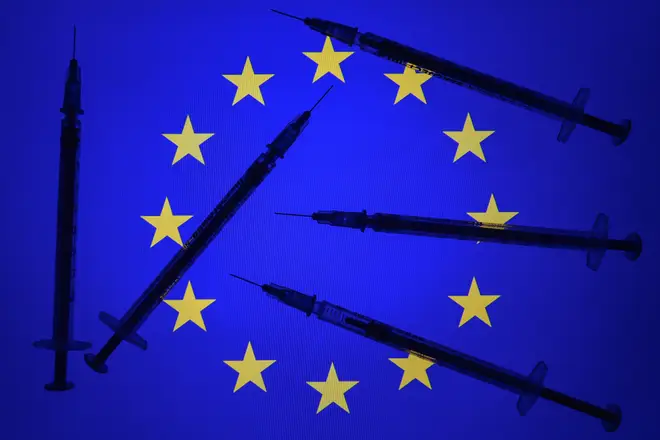
Ben Kentish 10pm - 1am
31 January 2021, 19:53 | Updated: 31 January 2021, 21:10

AstraZeneca has agreed to supply nine million additional doses of the Covid vaccine to the European Union during the first quarter, the bloc has said.
The decision to supply the European Union with more coronavirus vaccines comes following a bitter row between the 27-nation bloc and the pharmaceutical company.
Following a call with seven vaccine makers on Sunday, European Commission President Ursula von der Leyen said the firm will also start delivering jabs a week earlier than planned and expand its manufacturing capacity on the continent.
However, the new objective of 40 million shots by the end of March is still only half of AstraZeneca's original target.
Ms Von der Leyen, who has faced increasing pressure due to the European Commission's handling of vaccine orders in recent days, tweeted: "Step forward on vaccines."
But the EU is still far behind the UK and US in inoculating its population of 450 million people.
Exclusive: Jeremy Hunt tells LBC EU made 'catastrophic misstep' over Article 16 U-turn
One year of Covid-19: A timeline of the coronavirus pandemic

Jeremy Hunt: EU made 'catastrophic misstep' in Article-16 U-turn
Several reasons have been given for why the bloc's vaccine rollout has been comparatively slow, including national problems, delayed approval of the drugs compared to elsewhere and an initial shortage of supply.
The bitter row with the British/Swedish drug manufacturer led to the EU briefly overriding part of the Brexit deal on Northern Ireland over export controls on coronavirus vaccines.
Earlier on Sunday, former Health Secretary Jeremy Hunt told LBC that decision was a "catastrophic misstep" and that he was pleased it had since been resolved.
Speaking on Swarbrick on Sunday, Mr Hunt said: "I think the EU made a catastrophic misstep, but I'm very relieved it has been sorted out."
"The reality is, the battle this year, which realistically very few of us would have predicted a few months ago, is against new variants of the virus.
Watch: Truss dashes summer holiday hopes, telling LBC curbs on travel here to stay
Explained: What is the difference between the five Covid-19 vaccines?

Liz Truss welcomes cooperation with the EU on global vaccination
"And we are in a race at the moment to see whether we can vaccinate enough people to get transmission really low and before we get a variant that is immune to the vaccine.
"And the one thing you need in that context is international collaboration and cooperation, because we don't know where the next variant is going to come from. So we've got to be working closely."
AstraZeneca's announcement last week that it would initially only supply 31 million doses to the bloc's 27 member states due to production problems triggered a fierce dispute between the two sides.
Officials in Brussels said they feared the company was treating the EU unfairly compared to other customers, such as Britain.
On Friday, hours after regulators authorised the vaccine for use across the EU, the commission announced that it was tightening rules on exports of Covid-19 vaccines, sparking an angry response from the UK.
Step forward on vaccines.@AstraZeneca will deliver 9 million additional doses in the first quarter (40 million in total) compared to last week’s offer & will start deliveries one week earlier than scheduled.
— Ursula von der Leyen (@vonderleyen) January 31, 2021
The company will also expand its manufacturing capacity in Europe.
The commission has since made clear that the new measure will not trigger controls on vaccines shipments produced in the 27-nation bloc to Northern Ireland.
Under the post-Brexit deal, EU products should still be able to travel unhindered from the bloc to the region.
Member states praised the bloc's executive branch last year for signing numerous deals with vaccine makers, saying the joint purchase, using the combined market weight of the entire bloc, had ensured a fair distribution for all 27 countries at good prices.
In a statement, the European Commission said it planned to set up a specialised body to improve the bloc's response to the health emergency and "deliver a more structured approach to pandemic preparedness".
As part of the effort, together with industry, the EU said it would "fund design and development of vaccines and scale-up manufacturing in the short and medium-term, and also to target the variants of Covid-19".
"The pandemic highlighted that manufacturing capacities are a limiting factor," it said. "It is essential to address these challenges."
Listen & subscribe: Global Player | Apple Podcasts | Google Podcasts | Spotify